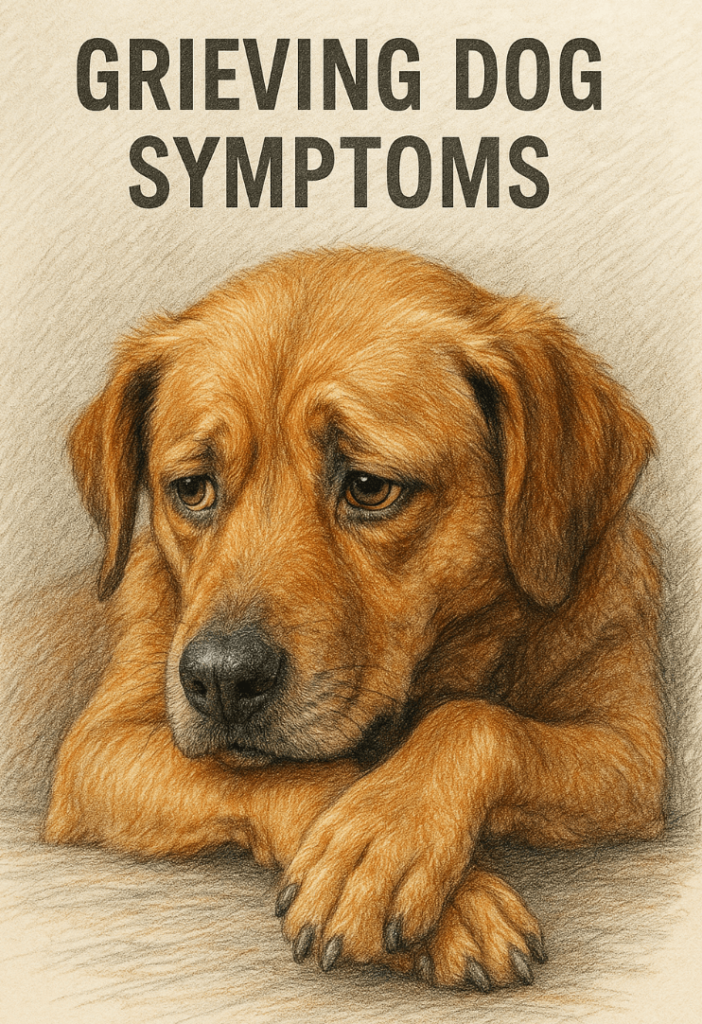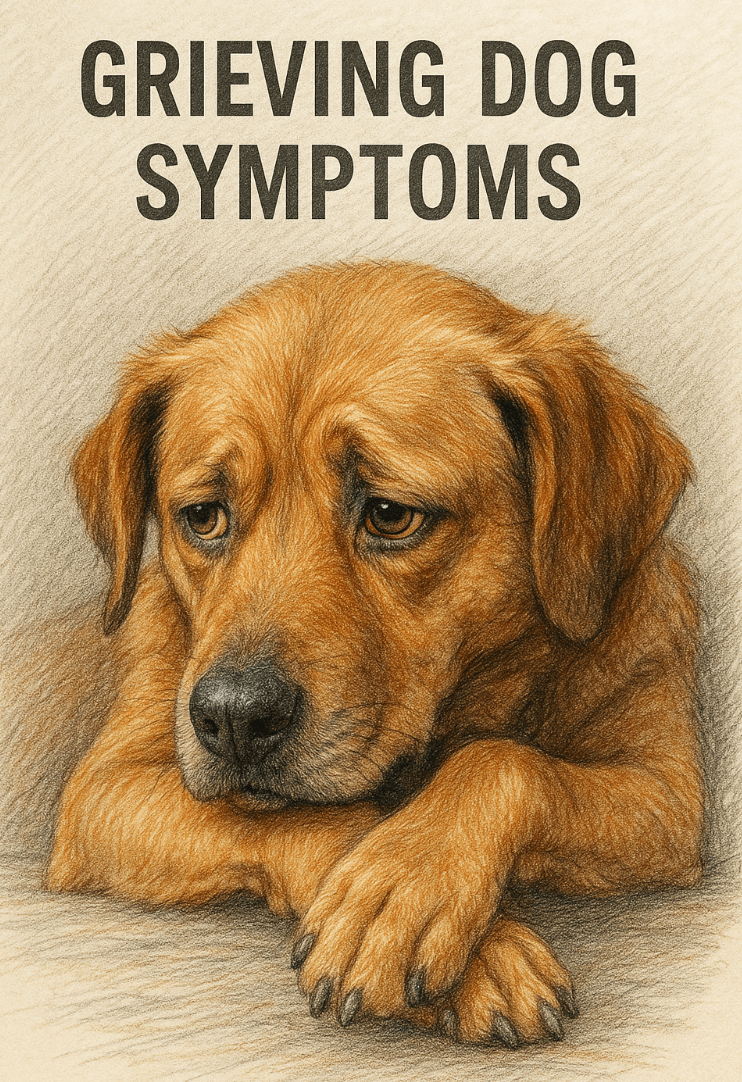Grieving Dog Symptoms: Understanding Your Pet’s Emotional Pain
Dogs are deeply emotional creatures, capable of forming strong bonds with their human companions and fellow pets. When a significant loss occurs—whether it’s the passing of a family member, another pet, or even a major change in their environment—dogs can experience grief just like humans do. Recognizing grieving dog symptoms is crucial for providing the support and comfort your furry friend needs during this challenging time. In this blog post, we’ll explore the signs of grief in dogs, how to help them cope, and ways to nurture their emotional well-being. By understanding their feelings, you can strengthen your bond and guide them through their healing process.
Common Grieving Dog Symptoms to Watch For
When a dog is grieving, they may exhibit a range of behavioral and physical changes. These symptoms can vary depending on the individual dog and the nature of the loss, but there are some common signs to look out for.
Loss of Appetite:
A grieving dog may show little interest in food, even for treats they usually love.Lethargy and Withdrawal:
They might become less active, spending more time sleeping or isolating themselves from family members.Excessive Vocalization:
Whining, barking, or howling more than usual can indicate distress or an attempt to seek comfort.Searching Behavior:
Dogs may wander around the house, looking for the missing person or pet, often checking familiar spots.Changes in Sleep Patterns:
Some grieving dogs sleep more than usual, while others may struggle to settle down at night.
These symptoms are natural responses to loss, but if they persist or worsen, it’s important to consult a veterinarian to rule out underlying health issues.
How to Support a Grieving Dog
Helping your dog navigate grief requires patience, empathy, and consistent care. Here are some practical steps you can take to comfort your grieving pet.
Maintain Their Routine:
Keeping feeding, walking, and play schedules consistent provides stability during uncertain times.Offer Extra Attention:
Spend quality time with your dog through gentle petting, cuddling, or engaging in activities they enjoy.Encourage Physical Activity:
Short walks or play sessions can boost their mood and reduce stress.Provide Comfort Items:
Blankets, toys, or items that carry the scent of the lost companion can offer reassurance.Monitor Their Health:
Keep an eye on their eating, drinking, and overall behavior, and consult a vet if you notice prolonged issues.
By taking these steps, you can help your dog feel safe and supported as they process their emotions.
Check this guide 👉Rattlesnake Bite Dog Symptoms: Best 7 Health Tips!
Check this guide 👉Dog Abscess Symptoms: Best 7 Health Tips!
Check this guide 👉Dog Pneumonia Symptoms: Best 7 Expert Tips!

Signs Your Dog Is Grieving | Ways to Help Them Cope |
|---|---|
Loss of appetite | Offer small, tasty meals frequently |
Increased vocalization | Provide calming music or white noise |
Searching behavior | Create a comforting space with familiar scents |
Lethargy and withdrawal | Engage them in low-energy playtime |
Changes in sleep patterns | Stick to a regular bedtime routine |
Physical Symptoms of Grief in Dogs
In addition to behavioral changes, grieving dogs may also display physical symptoms that indicate their emotional distress. These signs can sometimes be mistaken for illness, so it’s important to monitor them closely.
Weight Loss:
A lack of appetite over time can lead to noticeable weight loss, which may require veterinary attention.Digestive Issues:
Stress and grief can cause vomiting, diarrhea, or constipation in some dogs.Excessive Shedding:
Emotional stress can trigger increased shedding or dullness in their coat.Pacing or Restlessness:
Dogs may pace back and forth, unable to relax due to anxiety or confusion.Decreased Immunity:
Prolonged grief can weaken their immune system, making them more susceptible to infections.
Addressing both the emotional and physical aspects of grief ensures your dog receives comprehensive care during this difficult period.
Long-Term Strategies for Helping a Grieving Dog
While immediate support is essential, long-term strategies can help your dog fully recover and adapt to their new reality. These approaches focus on fostering resilience and rebuilding their sense of security.
Introduce New Activities Gradually:
Incorporate new games or training exercises to stimulate their mind and spark joy.Consider a Companion Pet:
If appropriate, adopting another pet can provide companionship and reduce loneliness.Create Positive Associations:
Reward calm behavior and engagement with treats or praise to reinforce positive habits.Be Patient with Recovery:
Healing takes time, and each dog processes grief differently—avoid rushing their progress.Seek Professional Guidance:
Animal behaviorists or trainers can offer tailored advice for managing persistent grief symptoms.
With consistent effort and compassion, your dog can learn to adjust and thrive again.
Misconceptions About Grieving Dogs
There are several misconceptions about how dogs experience grief, which can lead to misunderstandings about their behavior. Clarifying these myths helps foster better care and empathy.
Myth: Dogs Don’t Truly Grieve Like Humans Do:
While their expression of grief differs, dogs absolutely feel loss and mourn in their own way.Myth: Grieving Dogs Always Need Another Pet Immediately:
Introducing a new pet too soon can overwhelm a grieving dog; timing is critical.Myth: Ignoring Their Symptoms Will Speed Up Recovery:
Avoiding acknowledgment of their pain can prolong their distress; instead, validate their emotions.Myth: Grief Only Happens After Losing Another Pet:
Dogs can grieve the loss of any close companion, including humans or even major life changes.Myth: Grieving Dogs Are Beyond Help:
With proper care and patience, most dogs recover and return to their happy selves.
Understanding these truths allows you to approach your dog’s grief with greater sensitivity.
When to Consult a Veterinarian About Grieving Symptoms
While many grieving symptoms are normal, certain signs warrant a visit to the vet to rule out medical conditions or address severe distress.
Refusal to Eat for More Than 24 Hours:
Prolonged fasting can lead to dehydration and other health risks requiring immediate attention.Severe Lethargy or Weakness:
Extreme fatigue or inability to move could signal an underlying illness rather than grief alone.Unexplained Aggression:
Sudden aggressive behavior may indicate heightened stress or discomfort needing professional evaluation.Persistent Digestive Issues:
Chronic vomiting or diarrhea should be assessed to prevent further complications.Signs of Depression Lasting Months:
If your dog remains withdrawn or unresponsive despite efforts to help, consult a vet for additional guidance.
Timely intervention ensures your dog receives the care they need to recover fully.
Fun Ways to Rebuild Your Dog’s Confidence After Grief
As your dog begins to heal, introducing fun and engaging activities can help rebuild their confidence and restore their happiness.
Interactive Toys:
Puzzle feeders or treat-dispensing toys challenge their minds and redirect focus from sadness.Short Training Sessions:
Teaching simple commands or tricks boosts their self-esteem and strengthens your bond.Exploring New Places:
Visiting parks or trails introduces exciting experiences and encourages curiosity.Socialization Events:
Arranging playdates with friendly dogs fosters social interaction and joy.Positive Reinforcement Games:
Reward-based games like fetch or hide-and-seek create lasting memories and reinforce trust.
These activities not only entertain but also empower your dog to embrace life once again.
Frequently Asked Questions About Grieving Dog Symptoms
How long does it take for a dog to grieve?
The grieving period varies by dog; some recover within weeks, while others may take months.
Can dogs grieve the loss of a human?
Yes, dogs form strong bonds with their owners and can grieve deeply after losing a beloved human.
Should I let my dog see the deceased pet or person?
Allowing them to sniff or investigate can provide closure, but only if it doesn’t cause additional distress.
What if my dog won’t eat at all?
Contact your veterinarian immediately, as prolonged refusal to eat can lead to serious health complications.
Is it normal for my dog to act clingy after a loss?
Yes, clinginess is a common response to grief as dogs seek reassurance and comfort from their remaining companions.
Nurturing Your Dog Through Grief
Grieving dog symptoms remind us of the depth of our pets’ emotions and the importance of being attentive to their needs. While grief is a natural process, your role as a caregiver is vital in helping your dog heal and regain their zest for life. By recognizing their pain, offering unwavering support, and seeking professional help when needed, you can ensure your dog feels loved and secure during this challenging time. Remember, your presence and compassion are the most powerful tools in guiding your furry friend toward recovery.
Do Cats Have Taste Buds? Best 7 Expert Tips! – Discover how cats experience flavors and why their taste is so unique.
Do Dogs Have Taste Buds? Best 7 Expert Tips! – Discover how dogs experience taste, their preferences, and what it means for their diet and health.
Can Cats Taste Sweet? Best 7 Expert Tips! – Discover why cats can’t taste sweetness, how it affects their diet, and tips to keep them healthy and happy.
Can Dogs Taste Sweet? Best 7 Expert Tips! – Discover how dogs perceive sweetness, which foods are safe, and tips to manage their sweet cravings responsibly.





